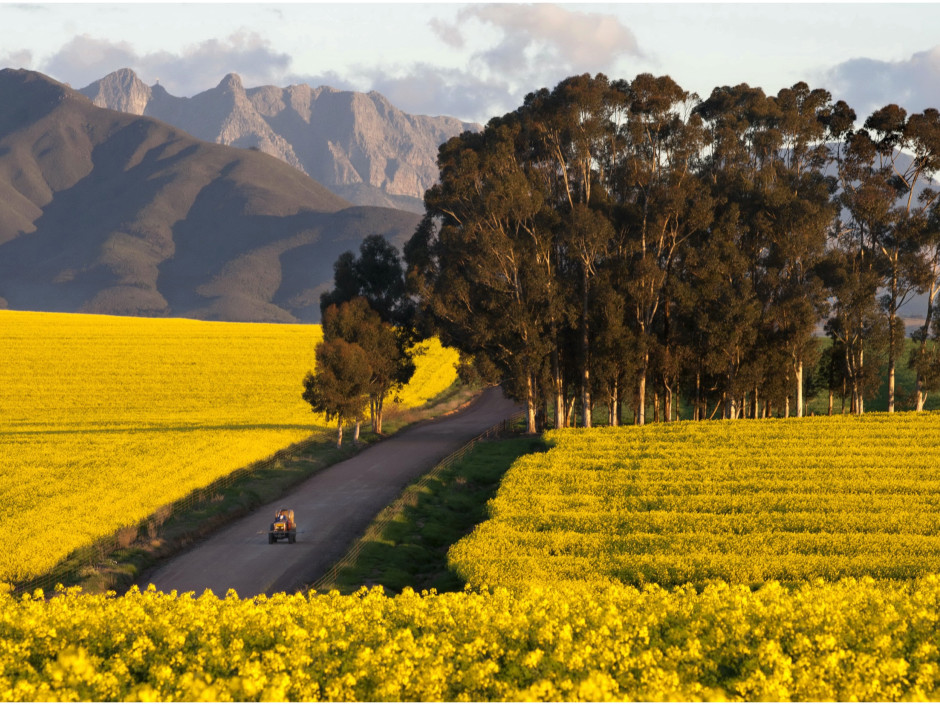Agritourism Around the World
Two leaders in agritourism from South Africa and India describe how inviting citizens onto farms can transform the lives of farmers and tourists alike.
South Africa: FARMER KNOWS BEST
Inviting tourists onto farms is not just about the money—it is about a family’s love for sharing what they do with others. This is what Founder and Managing Director of Agritourism South Africa, Jacqui Taylor, thinks. And it is why for Taylor, agritourism should be about letting farmers do what farmers do best.
My entire life has been dedicated to farming. My parents grew apples, pears and hops on their farm.
About three years ago I began my career as the first managing director of Agritourism South Africa. At the time, my technical knowledge of the field was based solely on my passionate agricultural and tourism experience. As a working farmer’s daughter, I started welcoming guests onto our farm some years ago. I quickly realized that the people who came to our farm were not expecting a fancy hotel or a theme park. They were looking for the “real deal”—to spend time with the farm staff and the family. In this sense, agritourism on a working farm cannot be separated from the farmer. We are part of the farm’s marketing brand. Even though my schedule is much busier since I became an ambassador for agritourism in Africa, I have always tried to welcome visitors before placing them in the hands of my experienced farming co-workers.
To be successful, agritourism cannot be a side-line operation, nor can it be something that is imposed from above, especially in South Africa with its unfortunate history of Apartheid.
If I were to tell a South African farmer how he/she should run his/her agritourism businesses, it would not go down well with other farmers, particularly non-white South Africans who have been told for too many years what they are allowed and not allowed to do. But perhaps the strength and beauty of South African agritourism is the diversity and that it has been born from the bottom up, assisting rural communities in regaining the dignity they lost. I strongly believe that agritourism should not only benefit the farmer, but also the larger community, the farm workers, and the local villages.
In Africa, agriculture is a choice you make—it is a family business. The farm is wealth whose currency is emotions. To this day, there is still a strong connection between farmers and urban populations: city people come back to farms to visit their families; and more and more foreign tourists are seeking out authentic agritourism experiences. Cape Town is beautiful, but you’ll find as many Europeans there as local South Africans. South African beaches are very nice, but so are other beaches around the world. What is unique about Africa is the rural environment— this is the real Africa. Lately an increasing number of scientists from around the world have been visiting our agritourism farms, for several reasons: the farms have a very low carbon footprint; and the crops that we grow – such as finger millet, locust bean, marama—are not only very high in protein, they grow without pesticides and they are very resistant to heat and drought conditions, making them an interesting investment crop for other regions around the world affected by climate change. The same applies to their livestock – the South African goats and sheep are self-sufficient and can live without drinking water for weeks. There are around 2,000 farmers who practice some form of Agritourism in South Africa. And the number is growing steadily. All of them are unique: an ostrich farmer who went into agritourism to recover financially from the decimation of his livestock by Avian Influenza; the San tribe, whose agritourism concept incorporates their amazing gifts as storytellers and artisans; the game-farm breeder who supplies the safari tourism industry and has a unique opportunity to become an agritourism player himself. There are no prerequisites for getting into agritourism except for having an authentic working farm embedded in a rural community, and to have a passion for and a pride in South African agriculture.
Jacqui Taylor, Managing Director of Agritourism
South Africa
Farm Holidays: The 1st World Congress on Agritourism in Bolzano/Bozen
The challenges and possible future prospects of agritourism were discussed at the first world congress on the subject, organised by Eurac Research in Bolzano from 7 to 9 November 2018. One hundred invited researchers, experts, stakeholders, professionals and political representatives from 42 countries brought their experience to the event. A total of 250 participants attended the three days of meetings.
“We wanted to create an international platform on the topic of agritourism,” explains Thomas Streifeneder, director of the Institute for Regional Development of Eurac Research and one of the organizers, “a place where international protagonists and experts in the field could exchange experiences and knowledge in an interdisciplinary way.”
In the face of all the possible forms of agritourism, the congress aimed to reach an agreement on its key characteristics. According to Streifeneder, “A farm holiday is a tourist activity on a working, often family-run farm. Agriculture must remain the sector in which the farmer spends more time than tourism. The daily activities of the farmers are the basis for a genuine offer. With appropriate policies, agritourism could help developing countries to keep small farms in remote areas alive. It is an activity that can safeguard the viability of small-scale farming and help maintain rural communities. One example that was tabled during the congress was that of Acolhida na Colônia, a network of family farms in Brazil that was compared with the South Tyrolean brand Gallo Rosso to understand how it can be a means for the sustainable development in the region. The congress was organised by Eurac Research, in collaboration with the Autonomous Province of Bolzano, the Union of South Tyrolean Farmers and Direct Farmers, the network of South Tyrolean holiday farms Gallo Rosso, the City of Bolzano and Innovation Development Marketing (IDM) - South Tyrol.
India: CULTIVATING RESILIENCE
Two decades ago Pandurang Taware turned his small farm in Maharashtra, India, into a successful agritourism business. Today, through his agritourism organisation, he wants to help other Indian farmers (and his country) find the same good fortune.
I am a grain farmer from the Indian state of Maharashtra. As such, I have struggled— like other small farmers around the globe—to keep the farm in the family. I needed a secondary business to stay afloat, and that is why in the early 2000s I started a second career as a tourism host. My guests are mainly Indian tourists from big cities who want to return to their rural roots. They want to work, eat, enjoy the country like the farmers. On my farm they can work the fields, ride the tractor, eat with us, and share stories.
I did not change my routine at the farm. I started gradually to include tourists, meaning that I mostly worked on my farm from Monday to Thursday and dedicated more time to my guests on the weekends. That’s when city people visit farms more often anyways. By selling my products directly to the tourists, I was able to cut out the middle person, which not only guarantees a better income, it is also empowering.
I dream of a broader political commitment that encourages farmers to pursue agritourism as a solution for keeping the farm in the family and the family on the farm.
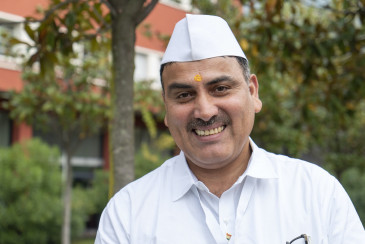
The success of my agritourism farm led to the foundation of the Agri Tourism Development Corporation in 2004. Today the corporation has 538 members and is growing constantly in other states too. We have a special training program for farmers who are interested in agritourism. The primary sources of our revenues are: 1) day and night tourist packages, 2) summer camps on farms for kids, and 3) training for farmers. Seventy per cent of the corporation’s revenues are returned to the farmers, which is a big incentive to participate in the programme.
I am frequently asked how we guarantee the quality of our organisation’s members. We regularly visit the agritourism farms and give advice (for example, do not build a pool), but I prefer to not talk about quality control: to be authentic, agritourism has to come from within, it cannot be imposed on farmers. On the other hand, we are constantly learning from each other in our training sessions when it comes to marketing or organisation. In 2005 I put together the first national agritourism congress in Mumbai. Thirteen years and an equal number of national conferences later, India is still operating on its basic tourism policy. Our government and responsible ministries (agriculture and tourism) have not taken into consideration the growing sector of agritourism – especially in the domestic tourism market. I dream of a broader political commitment that encourages farmers to pursue agritourism as a solution for keeping the farm in the family and the family on the farm.
Pandurang Taware, Director of the Agri Tourism Development Corporation (ATDC)
Related Articles
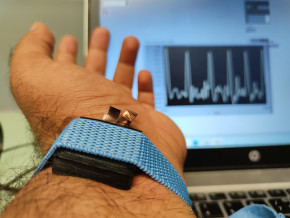
Tecno-prodotti. Creati nuovi sensori triboelettrici nel laboratorio di sensoristica al NOI Techpark
I wearable sono dispositivi ormai imprescindibili nel settore sanitario e sportivo: un mercato in crescita a livello globale che ha bisogno di fonti di energia alternative e sensori affidabili, economici e sostenibili. Il laboratorio Sensing Technologies Lab della Libera Università di Bolzano (unibz) al Parco Tecnologico NOI Techpark ha realizzato un prototipo di dispositivo indossabile autoalimentato che soddisfa tutti questi requisiti. Un progetto nato grazie alla collaborazione con il Center for Sensing Solutions di Eurac Research e l’Advanced Technology Institute dell’Università del Surrey.
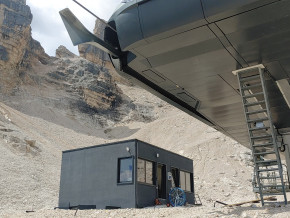
unibz forscht an technologischen Lösungen zur Erhaltung des Permafrostes in den Dolomiten
Wie kann brüchig gewordener Boden in den Dolomiten gekühlt und damit gesichert werden? Am Samstag, den 9. September fand in Cortina d'Ampezzo an der Bergstation der Sesselbahn Pian Ra Valles Bus Tofana die Präsentation des Projekts „Rescue Permafrost " statt. Ein Projekt, das in Zusammenarbeit mit Fachleuten für nachhaltiges Design, darunter einem Forschungsteam für Umweltphysik der unibz, entwickelt wurde. Das gemeinsame Ziel: das gefährliche Auftauen des Permafrosts zu verhindern, ein Phänomen, das aufgrund des globalen Klimawandels immer öfter auftritt. Die Freie Universität Bozen hat nun im Rahmen des Forschungsprojekts eine erste dynamische Analyse der Auswirkungen einer technologischen Lösung zur Kühlung der Bodentemperatur durchgeführt.
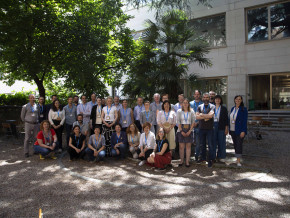
Gesunde Böden dank Partizipation der Bevölkerung: unibz koordiniert Citizen-Science-Projekt ECHO
Die Citizen-Science-Initiative „ECHO - Engaging Citizens in soil science: the road to Healthier Soils" zielt darauf ab, das Wissen und das Bewusstsein der EU-Bürger:innen für die Bodengesundheit über deren aktive Einbeziehung in das Projekt zu verbessern. Mit 16 Teilnehmern aus ganz Europa - 10 führenden Universitäten und Forschungszentren, 4 KMU und 2 Stiftungen - wird ECHO 16.500 Standorte in verschiedenen klimatischen und biogeografischen Regionen bewerten, um seine ehrgeizigen Ziele zu erreichen.
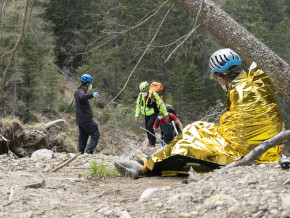
Erstversorgung: Drohnen machen den Unterschied
Die Ergebnisse einer Studie von Eurac Research und der Bergrettung Südtirol liegen vor.
